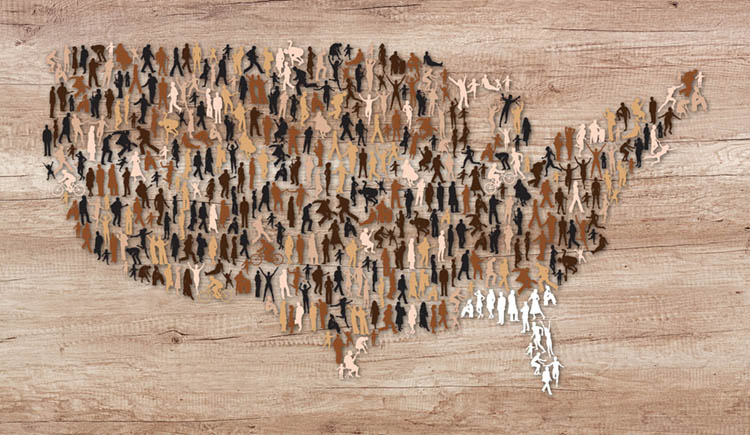As SCOTUS confirmation hearing ends, a 'well qualified' Barrett avoids controversy and opinions
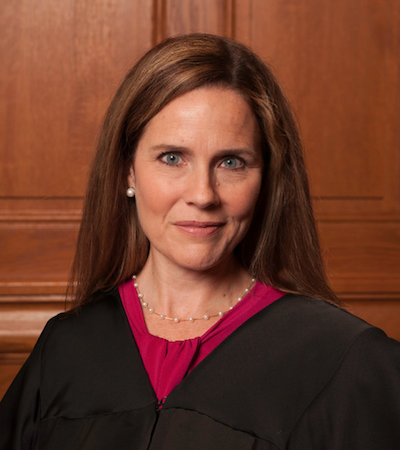
Judge Amy Coney Barrett in 2018. Photo from Wikimedia Commons.
U.S. Supreme Court nominee Judge Amy Coney Barrett remained unflappable during her confirmation hearing this week, as she politely deflected questions about her views on cases establishing rights to abortion and same-sex marriage.
Barrett has been described as “unashamedly pro-life” by Senate Judiciary Committee Chairman Lindsey Graham of South Carolina and a “legal titan who drives a minivan” by one of her home state senators, Republican Sen. Mike Braun of Indiana. She is a former professor at the University of Notre Dame Law School, a mother of seven, and a judge on the 7th U.S. Circuit Court of Appeals at Chicago.
Barrett has said judges are not policymakers, and they must set aside any policy views that they hold. Barrett told the Senate Judiciary Committee that she does not have any agenda, and she will stick to the rule of law and decide cases as they come.
Barrett has said she has the same originalist and textualist philosophy as the late Justice Antonin Scalia, for whom she clerked. But she was quick to point out during her confirmation hearing that she doesn’t necessarily agree with everything he has said.
“I hope that you aren’t suggesting that I don’t have my own mind,” Barrett said when Democratic Sen. Christopher Coons of Delaware asked whether she agreed with Scalia’s criticism of Griswold v. Connecticut. The 1965 Supreme Court decision held that married couples have the right to use contraceptives in the privacy of their home.
Barrett refused to say whether she agreed with Scalia’s belief that Griswold was wrongly decided. But she did say she thought that the Griswold precedent was very “unlikely to go anywhere” because no legislature will outlaw contraception.
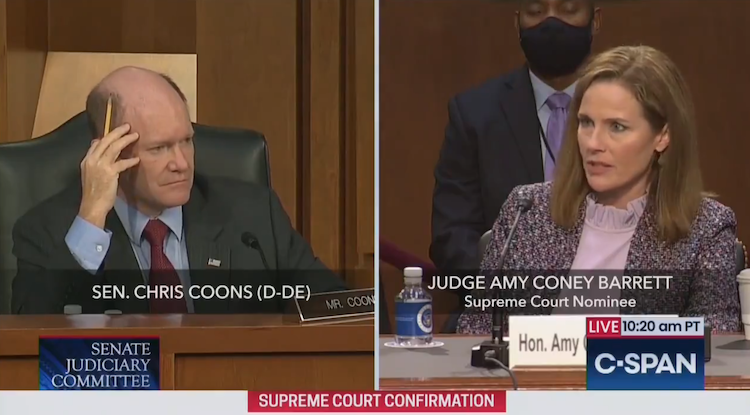 Democratic Sen. Christopher Coons of Delaware questions U.S. Supreme Court nominee Judge Amy Coney Barrett during her confirmation hearing Oct. 14. Image from C-SPAN.
Democratic Sen. Christopher Coons of Delaware questions U.S. Supreme Court nominee Judge Amy Coney Barrett during her confirmation hearing Oct. 14. Image from C-SPAN.
Barrett said Coons’ questions about Griswold and privacy interests appeared to be laying the groundwork for questions about whether Roe v. Wade was wrongly decided. And Barrett said she couldn’t opine on the issue.
Barrett also saw a game of gotcha after Sen. Kamala Harris of California, who’s also the 2020 vice presidential candidate, asked a series of questions. Does Barrett think that COVID-19 is infectious? Does Barrett think that smoking causes cancer? Barrett answered yes to both questions.
Harris then asked whether Barrett thought that climate change “is happening and it’s threatening the air we breathe and the water we drink.”
Barrett said she wondered where Harris was going with her line of questions.
“You have asked me a series of questions, like, that are completely uncontroversial,” she said, then tried to get an “opinion from me that is on a very contentious matter of public debate.”
Barrett also refused to answer questions about other matters involving politics or current events. She would not say whether a president has the power to pardon himself, whether the government could delay an election, or whether a president’s refusal to comply with a court order is a threat to the nation’s constitutional system. And she would not say whether she would recuse herself in specific cases, including a case involving 2020 election results.
“If I give off-the-cuff answers,” Barrett said, “then I would be basically a legal pundit, and I don’t think we want judges to be legal pundits.”
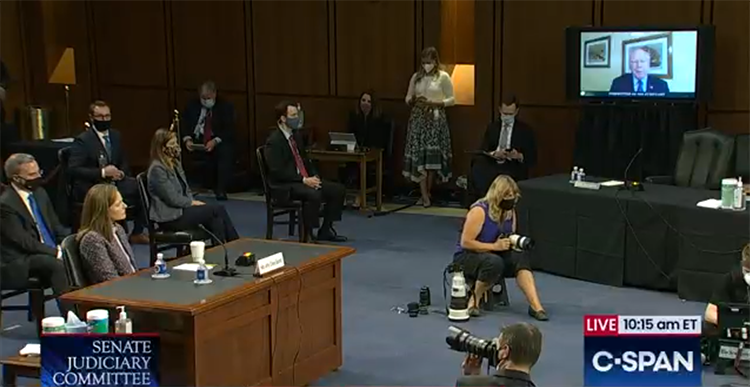 Sen. Patrick Leahy of Vermont attended the hearing remotely because of the risk of COVID-19 contagion. Image from C-SPAN.
Sen. Patrick Leahy of Vermont attended the hearing remotely because of the risk of COVID-19 contagion. Image from C-SPAN.
Democrats on the Senate Judiciary Committee had highlighted constituents throughout the hearing whose health care was dependent on the Affordable Care Act. A pending Supreme Court case considers whether the health care law’s insurance mandate is still constitutional after Congress eliminated the tax penalty for failure to carry insurance.
Barrett had written a 2017 law review article in which she criticized the 2012 Supreme Court opinion upholding the law under Congress’ taxing power.
But Barrett said she was not “hostile” to the Affordable Care Act, and the issues now before the Supreme Court are different than those discussed in her article.
Barrett said she had made no commitments on how she would rule in any case to President Donald Trump or anyone else. If she had, it would be “a gross violation of judicial independence,” she said. And it would be “a complete violation of the independence of the judiciary” for anyone to put a justice on the court as a means of achieving a particular result, she said.
Barrett offered some hints about her views when she said Roe v. Wade is not a “super precedent,” as the term is defined in scholarly literature, because it isn’t among the cases that no one questions anymore.
Barrett had written about the topic in a 2013 Texas Law Review article that listed seven cases generally deemed to be super precedent, including the school desegregation decision Brown v. Board of Education and the judicial review decision Marbury v. Madison.
Asked about the importance of precedent, Barrett said she would obey all the rules of stare decisis. If a question arises about overruling precedent, she would look at the required factors, including the reliance interest created by the decision, and whether a precedent had been undermined by later facts and law.
She emphasized that judges don’t consider overruling precedent unless presented with a controversy that begins with a challenge to a law.
“Judges cannot just wake up one day and say, ‘I have an agenda, I like guns, I hate guns, I like abortion, I hate abortion,’ and walk in like a royal queen and impose their will on the world,” Barrett said. “You would have to wait for cases and controversy.”
She also said she has a general belief that racism is “abhorrent” and used the same word to describe discrimination when asked about LGBTQ bias.
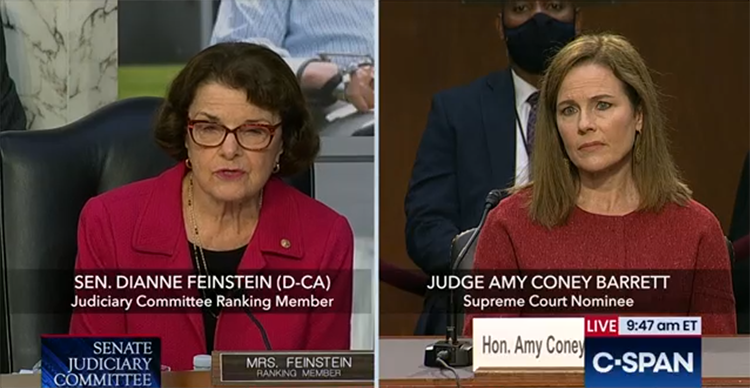 In response to a question by Sen. Dianne Feinstein, Judge Amy Coney Barrett said, “I have never discriminated on the basis of sexual preference and would not ever discriminate on the basis of sexual preference.” Image from C-SPAN.
In response to a question by Sen. Dianne Feinstein, Judge Amy Coney Barrett said, “I have never discriminated on the basis of sexual preference and would not ever discriminate on the basis of sexual preference.” Image from C-SPAN.
“I have no agenda, and I want to be clear that I have never discriminated on the basis of sexual preference and would not ever discriminate on the basis of sexual preference,” Barrett said.
Later, Barrett apologized when told that the term “sexual preference” is offensive to some because it implies that sexual orientation is a choice. Sexual orientation is the preferred word, said Democratic Sen. Mazie Hirono of Hawaii.
Barrett said she would never intentionally use a term that would cause offense to the LGBTQ community.
Barrett said it is obvious that racism still exists, and it’s personal for her multiracial family of seven children. She said she wept with her 17-year-old daughter Vivian, who was adopted from Haiti, after they saw the video of George Floyd, a Black man who died while a Minneapolis police officer pressed his knee to Floyd’s neck. Vivian had to grapple with the idea that there could be a risk to her brother or to a future son, Barrett said.
Barrett has received a “well qualified” rating from a substantial majority of the ABA Standing Committee on the Federal Judiciary. Barrett earned plaudits on all three criteria of integrity, professional competence and judicial temperament. Notably, “not one person uttered a negative word about her character,” the committee said in prepared testimony.
The ABA’s assessment was echoed in Senate Judiciary Committee appearances by colleagues and those she mentored.
Patricia O’Hara, retired dean at the University of Notre Dame Law School, said Barrett’s opinions on the 7th Circuit had the same characteristics of her academic writing as a Notre Dame law professor. Those characteristics are intellectual rigor, painstaking analysis, clarity of legal reasoning and writing, and a deep commitment to apply the law to the facts of the case before her.
Barrett is “brilliant but humble, fair and impartial but empathetic, open-minded and respectful of differences,” O’Hara said.
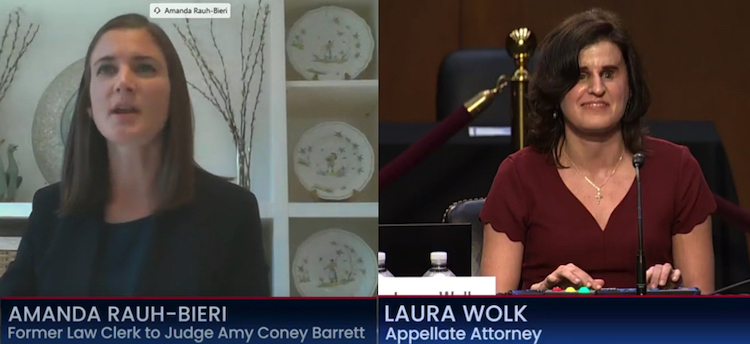 Amanda Rauh-Bieri and Laura Wolk speak during the fourth day of Judge Amy Coney Barrett’s U.S. Supreme Court confirmation hearing. Images from C-SPAN.
Amanda Rauh-Bieri and Laura Wolk speak during the fourth day of Judge Amy Coney Barrett’s U.S. Supreme Court confirmation hearing. Images from C-SPAN.
A former law clerk and a former student of Barrett’s were among those praising Barrett’s intellect and kindness in appearances before the Senate Judiciary Committee. Barrett “has the rare gift of lifting everyone around her,” said Amanda Rauh-Bieri, a law clerk during Barrett’s first term on the 7th Circuit.
Former Notre Dame law student Laura Wolk, who is blind, said Barrett cut through the red tape and got her the equipment that she needed when her laptop began to fail as a 1L. Wolk later became the first blind law clerk for a Supreme Court justice.
Rauh-Bieri and Wolk described Barrett as a mentor who gave them encouragement and confidence. If Barrett is confirmed, the country “will gain the service of one of the kindest individuals I have ever known,” Wolk said.
Barrett offered her advice to new lawyers in response to a question by Republican Sen. Joni Ernst of Iowa.
“I guess I would just say, you know, live life to the fullest, seize all of the opportunities you have, and do your best,” Barrett said. “But at the same time, never let work crowd out all of the other precious things in your life, like friends and family and faith and exercise. … I think all of those things that make up our lives apart from work, you know, can’t be shoved aside.”
A Senate Judiciary Committee vote on Barrett’s nomination is scheduled for Oct. 22. The full Senate could vote by Oct. 26.
ABA Journal Coverage of Amy Coney Barrett Hearings
Day Four
- 4 major takeaways from the Amy Coney Barrett confirmation hearings
- As SCOTUS confirmation hearing ends, a ‘well qualified’ Barrett avoids controversy and opinions
- Barrett had ‘rare gift of lifting everyone around her;’ former clerk and law student praise her kindness
- Why Amy Coney Barrett got a ‘well qualified’ rating from ABA standing committee
Day Three
- Is Barrett an adequate Ginsburg replacement? Debate over philosophy is appropriate, she says
- Barrett won’t give her opinion on ‘contentious matter’ of climate change
- ‘I hope that you aren’t suggesting that I don’t have my own mind,’ Barrett tells senator
- SCOTUS nominee says she’d keep an open mind about cameras in the high court
- Barrett: No one is above the law, but Supreme Court can’t force other branches to comply with judgments
- Barrett: Sharing Scalia’s philosophy doesn’t mean I agree with every sentence he said
Day Two
- Sen. Booker complains of rushed nomination process for Barrett, notes Notre Dame profs’ call for delay
- After seeing George Floyd video, Barrett says she wept with her daughter
- Barrett says she doesn’t see Roe v. Wade as ‘super precedent’
- SCOTUS nominee Barrett says she’s not ‘hostile’ to the Affordable Care Act
- Would Barrett recuse in 2020 election case? She spoke of appearances but didn’t answer the question
- Barrett: Racism and discrimination is ‘abhorrent’; ‘I have never discriminated on the basis of sexual preference’
Day One
- In delayed remarks, retired Notre Dame law dean praises Barrett as ‘brilliant but humble’
- Democrats at Barrett confirmation hearing focus on health law, even as they label proceedings a ‘sham’
- Judge Amy Coney Barrett rated ‘well qualified’ for Supreme Court by ABA standing committee
- Barrett tells of lessons learned from Scalia in confirmation hearing opening statement

